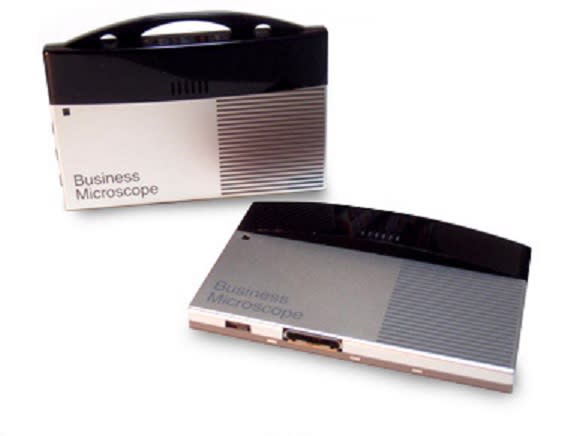An employee ID capable of spying on you
NSA meets Dunder Mifflin. Will executive staff need to wear them, too?

The employee badge you're wearing could be spying on you.
CNN reports that Hitachi, a Japan-based electronics manufacturer, is selling an Orwellian device with that capability to corporations looking to improve workplace efficiency.
The 33-ounce Hitachi Business Microscope looks like a typical employee ID. But embedded in each badge are "infrared sensors, an accelerometer, a microphone sensor and a wireless communication device" capable of tracking "who talks to whom, how often, where and how energetically."
According to Hitachi, the badge records, among other things, "the distance between people talking face-to face" and "an individual's activity level (active or nonactive), which is determined on the basis of subtle movements detected (such as talking, nodding and silence)."
In other words, it tracks your every move.
"Imagine being followed around the office or the factory all day by the snoopiest boss in the world," Bob Greene wrote on CNN.com. "Even into the restroom."
Take an extra long bathroom break? Your boss knows.
Spend too much time talking sports with Steve in accounting? Your boss knows.
Not energetic enough in strategy meetings? Yep, your boss knows that, too.
Before leaving the office, employees are instructed to place the badge in a cradle, which recharges the battery, downloads the data and sends it to Hitachi's data center.
By analyzing the "enormous amount of data collected with the Business Microscope," Hitachi boasts, company brass will be able "to propose methods to improve organizational communication and quantitatively evaluate efficacy."
If it sounds like the NSA meets Dunder Mifflin Paper Company, the fictional workplace in the TV show "The Office," that's because it is.
The Business Microscope was first developed in 2007. In 2012, Hitachi rolled out improved analytics technology to help companies "sensibly visualize inner-company communication."
It's unclear how many of the devices Hitachi has sold or how many companies are currently using them. A representative for Hitachi did not immediately return a request for comment.
But the push to monitor employees' movements at work has been gathering steam.
Wearable tech like smart watches and Google Glass are allowing companies to gather "subtle data" about their employees — and drawing the ire of privacy advocates.
"It's true that employers are paying for your time when you're on the clock, but micro-monitoring is not a good way to ensure maximum productivity," John Hayward wrote on Breitbart.com. "It's far better to create an environment in which employees have incentives to perform. Supervision is not the same thing as surveillance."
"I'm curious," Eric Hopp wrote on DailyKos.com. "If corporations start forcing their employees to wear these Hitachi Business Microscope, will the CEOs and top corporate leaders also be required to wear these devices? And who will be listening?"
"Before companies ask employees and customers to strap gadgets to their heads, chests or wrists, they should let the users know exactly what’s being tracked and analyzed," Greg Beaubien wrote on PRSA.org. "Pushing wearable gadgets to increase efficiency or productivity will likely backfire and hurt morale."

